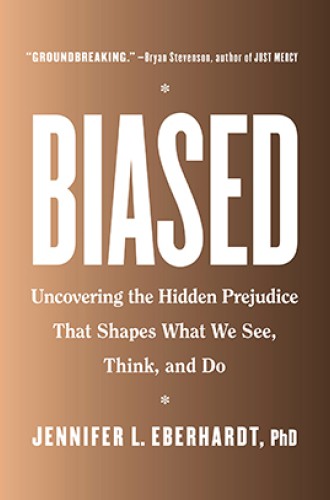Taking implicit racial bias seriously
Jennifer Eberhardt insists that personal prejudice is deeply embedded, politically potent, and ultimately beatable.
The once radical claim that racism is much more than personal prejudice has become, for many, an article of faith. It goes without saying that racism is a social and systemic reality, the sedimentation of a centuries-long effort to structure every aspect of life according to the logic of white supremacy. To frame racism in terms of prejudiced hearts and minds not only misses the forest for the trees; it is morally and politically suspect. So long as we treat racism as a matter of internal dispositions in need of education and moral exhortation, we culpably neglect the systemic problem in need of legislation and political transformation.
So we are told. But Jennifer Eberhardt, who teaches social psychology at Stanford University, charges us to reconsider this prejudice against prejudice. To be clear, she does not mean to dispute the manifestly structural nature of racism. Rather, her concern is to understand how those structures seep into our inner lives and distort our perceptions and judgments.
Read our latest issue or browse back issues.
So long as we neglect the awkward feelings that emerge in interracial interactions, the subtle hunches that incline jurors toward guilty verdicts, and the nearly reflexive urge many white people feel to lock the car doors in majority black neighborhoods, Eberhardt contends that we will misunderstand what makes racial injustice so recalcitrant and equality so elusive.
To fill in this gap, Eberhardt has devoted her career to the study of implicit racial bias, which she calls “a kind of distorting lens that’s a product of both the architecture of our brain and the disparities in our society.” These biases are cognitive associations that link groups of people (black people, women, the elderly, the obese) to evaluative qualities (threatening, needy, slow, irresponsible). Unlike explicit biases, we make these connections unconsciously and automatically.
On the one hand, this is a necessary part of healthy cognitive functioning. Human brains have evolved to quickly and effortlessly sort through the vast barrage of information in our environment. When a venomous snake strikes at my foot, I flag the snake as dangerous and leap out of the way without even thinking. Our prehistoric ancestors survived in part because their brains were good at putting things into boxes.
It gets messier when these evolutionary blessings link up with cultural forces and the racial stereotypes they circulate. Over the last three decades, social psychologists like Eberhardt have repeatedly shown that implicit biases linking black people to negative traits like criminality, hostility, and laziness are widespread among the American population.
These antiblack biases are detected in both white and black people (albeit to different degrees), so they are not simply functions of in-group preferences, long known to be part of our evolutionary inheritance. Instead, they reflect broader cultural scripts that people internalize simply by living in racially structured societies. Even more disturbing, research shows that once these biases are internalized, they are extremely difficult, perhaps even impossible, to suppress and control.
One might be tempted to think that while implicit bias is a fascinating feature of human nature, it is really the surge of decidedly explicit racial bias that warrants our concern. After all, there was nothing implicit about an arena filled with people chanting “send her back” or torch-wielding Nazis marching through Charlottesville.
But Eberhardt takes pains to show that the subtler forms of bias she studies pack serious political punch. They influence whose résumé rises to the top, whose movements appear “furtive” to police officers, and even who gets sentenced to death.
In one especially chilling case, researchers presented participants with images of a person holding either a harmless object or a gun. They were instructed to press a button marked “shoot” when a gun was present and “don’t shoot” when it was merely a harmless object. Both black and white participants were quicker to press “shoot” when the person holding the gun was black, and they were more likely to mistake a harmless item for a gun when it was in the hands of a black person.
Eberhardt presents this research with such elegance and clarity that it is easy to forget just how unwieldy, technical, and utterly terrifying this body of literature is. She’s a social-scientific Virgil, offering expert commentary that illumines the book’s otherwise lightless descent into the hellish depths of racial prejudice. She also registers the human impact of racial bias with engaging storytelling, the most moving of which is autobiographical. It takes a field-defining scholar to synthesize the research, but it takes a black mother whose young sons have already been targeted by these biases to articulate the cost.
Despite the book’s goal of showing how deeply embedded racism is, Eberhardt is adamant that we are not stuck. Humans are creatures of habit, but the evidence suggests that we are also capable of reforming those habits through vigilance and accountability.
Though she endorses training sessions on implicit bias as potentially valuable, Eberhardt cautions against any hope that we can be “trained out of this.” She writes, “Bias is operating on a kind of cosmic level, connecting factors and conditions that we must individually make an effort to comprehend and control. And it deserves a cosmic response, with everyone on board.”
At the end of her journey through the soul’s ambiguous depths, Eberhardt leaves us with a familiar picture. An elemental disruption in the cosmos has bound us in ways we can never fully comprehend. And yet, with everyone on board, or perhaps on account of something even more encompassing than that, we might find the grace to respond.






